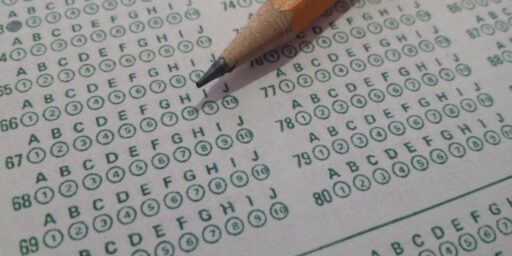EDUCATION VOUCHERS
Matthew Yglesias isn’t sold on school vouchers:
[W]hat, exactly, it is that conservatives think vouchers are going to do. After all, it’s not as if there are millions of private school slots sitting empty right now just waiting for people to pony up the tuition money. If you made vouchers available to public school students who couldn’t otherwise afford private schools, some pretty small number of them would displace richer occupants from a few existing private school slots, but for the overwhelming majority of public school students, there would be no change at all. Plus, the displaced private school students would either wind up in public school or else displacing a candidate from a less selective private school who, in turn, would wind up in public school or else [future iterations here].
Either way, the total number of public school students wouldn’t change very much, and public schools wouldn’t get any better as a result of the process. Indeed, they’d probably get a little worse since you’d be dragging average student quality down. There may be good reasons for wanting to adopt a plan like this (there’s a sense it which it would be fairer, at least to the smartest of poor kids), but I have a really hard time seeing how this could be a solution — or even a major part of a solution — to America’s education problem.
There are clearly many variants on the proposal. But most would posit that, 1) the market would create more private schools were there more dollars chasing seats and 2) many of the plans would allow parents to chose from among public schools, allowing them to send kids to the richer side of town to go to the better schools. Theoretically, both of these things would lead to increased competition since the lesser public schools would soon have fewer butts stuck in those seats and hence fewer dollars coming in to continue the employment of incompetent teachers and administrators.
Are there practical problems with this? Sure. For one thing, a lot of parents with kids in lousy schools are pretty lousy parents and frankly don’t care. Some of those who do care can’t afford to transport them across town to a better school. And there are presumably information barriers as to which schools are really “better.”
But, given that nothing else seems to work at fixing lousy inter city and rurual schools, I suppose this is worth a shot.






But why would “the market” create more schools? The private schools that exist nowadays are non-profit institutions that depend on donations to pay the bills over and above what they charge in tuition.
Hmm. I know that’s true of, say, the Catholic schools but didn’t think that was generally true.
On the practical level, at least where I live (Baltimore), vouchers would probably create an “arms race” for private school facilities similar to what we are seeing on the university level. Demand for slots and a lack of classroom space, coupled with subsidized tuition, is I think, a recipe for problems. I am not sure it is worth a shot, you may just end up ruining the private school system as well.
The point of the Vouchers Movement is control. Up until the courts federalized the public school system, schools were controlled locally by parents and their local political representatives.
Vouchers would shift the balance of power back to the parents and away from unelected judges. It would be very difficult for a judge to justify anti-discrimination rulings when parents can freely choose where to send their kids.
Also, childless social engineers who use the public school system as an outlet for their propaganda would be cut off at the knees. With less time spent on the social agenda, more time could be spent actually educating our kids rather than indoctrinating them.
The better question is: “What are the liberals afraid of?” If so little will change, why not give it a shot.
Matthew asks: “But why would “the market” create more schools?”
Maybe he should read about Pat Taylor.
Taylor is a near billionaire who would probably be a billionaire by now if not for the money he spent sending the children to Louisiana to college.
Pat has donated million of his own dollars to support higher education. Many people do not know that because of the “Taylor Plan” children in Louisiana who meet modest GPA/ACT/Income requirements can go to collage free. He spent years guilting the lege to make this happen.
Pat Taylor has said many times that if vouchers because a reality he would open a dozen schools the next day. WHY? To make money. I’m sure that is enough to make Yglesias cringe, but too bad.
If Pat opened a dozen schools tomorrow, there would be a line outside the door to get students in.
As a national average we spend almost $10,000 per year per student on education and that does not include paying off the building!
Can you imagine the money to be made?
The most expensive private school in this state only cost $12,000 per year. (BTW that is where Payton Manning and his brothers went.) WHY on earth are we spending 10K a year on kids in public schools and not getting similar results? I promise you, those kids can freaking read.
The money wasted on education is appalling. The money to be made by someone who can actually run a school and teach our children is amazing.
Which actually answers my question. What are liberals afraid of???
That it would work.
And THAT is pathetic.
If vouchers were in effect, many many disaffected and noncomformist teachers would start up their own schools to compete directly with the public school system. Vouchers would make the probability of success much greater, and creative educators would rush in to fill the market void.
And, as Paul said, since public schools spend so much (read: waste so much) money, it would be a relatively simple matter to beat them and produce a better product (that is, a better-educated child).
Well, according the 20 year study of the Chilean voucher experiment:
Basically, vouchers simply rearranged the deck chairs, rather than actually increasing performance. The paper is here ($5 to download). There’s another excellent paper here (free) on the Chilean voucher experiment.
As this is the longest study under the best conditions possible for vouchers (i.e. no restrictions, universally available), it would do anyone well to actually read these before spouting the usual party ideology… (that’s you Paul)
The tuition for many exclusive private schools would also go up about the amount of the vouchers. also the poor areas would not have a much of a choice, if you were developing a businesses plan for a for profit school would the foundation of that plan be, open up schools in the poorest areas? It could turn out to be that the rich districts would be a hotbed of competition and the poor schools would be underserved creating more a divide then we have now.
Oh, and before you start lambasting me Paul, please understand that I’m actually quite neutral on vouchers. I think they can be used effectively. I just think we should experiment first and understand the existing data before we just blindly believe the market will work as we intuitively think it will. Certainly in the Chilean case, the market did not act as widely expected…
The issue also involves the supply of qualified teachers. Private schools tend to do well through two strategies:
1) charge lots of money, and so pay teachers highly (most for-profit, non-sectarian prep schools)
2) charge only the same or even a little less than public schools, but use a moral pitch (most parochial schools).
The idea that there are lots of qualified, good teachers out there waiting to be hired by new efficient private schools is ludicrous. We can’t even staff the public schools we have. The only way to attract more people to the teaching profession would be to pay the teachers more– but then you’re soaking up the voucher money to pay the teachers the extra.
David,
Honestly, I think teacher pay is the least of our problems. Frankly, they’re paid pretty well for people with BA degrees and a 9 month work year. The problem with attracting competent teachers is the education bureaucracy, the feeling they’re not supported in their mission, and the requirement in most states to get a degree in pedagogy rather than a subject even for teaching at the secondary level.
I’d note that college teacher pay is rather abysmal given the high barriers to entry–years and years studying for a PhD–and people are standing in line begging for positions.
I tell what JC, John, JohnC or what ever your name is today…
There is a much better study closer to home. Go back and google again. (or did you find that one and choose not to use it???)
SINCE YOU CLAIM to be neutral obviously you would want to find which state I am talking about and bring the evidence here. Chile is a poor example for a number of reasons.
Since you claim you are more interested in the truth than party ideology, you goggle around and tell me why. What is the major problem with using Chile as an example?
BTW AT BEST you have said there is nothing wrong with vouchers. Ya gotta do better than that to be a true troll. Don’t vouchers in some way prove bush to the the devil?
BTW I know the above answers without google. But since you are the poster boy for neutrality on this one, you tell me the answers to my questions.
David,
There is a school here in town that charges $9816 a year tuition. That is real close to the the amount we (the tax payers) pay per year per kid. (I think within 100 bucks actually)
The private school offers a 12 month class for that price and has 2 teachers in a room of 24 kids. (summer session is optional and mostly playtime, but it is paid for.)
Do the math, 24 kids at $9816 = $235,584 a year. Dude, that is almost a quarter of a million dollars per classroom.
The owner told me 40% of her gross goes directly to the teachers. I’ll save you the math. That is $47,117 a year and 2 of them share 24 kids. That is a 12 to 1 ratio but is actually better than that since you have a team effect.
If one teacher is out sick there is no wasted day while a sub has them build paper airplanes. The kids keep right on working. For that much money the kids get a hot lunch every day and a snack/juice break. All paid for.
After the teachers are paid, the owner has $141,250 bucks a year PER CLASSROOM to pay the rent, electric, lunch and other staff.
Anything the kids could want they get, the teachers are paid about double what they could get in the public schools around here and the owner is driving around in a $100,000 car and flying back and forth between here and Chicago (where she lives) at least once per week.
Now you try to tell me we should have a teacher pay problem???
With all due respect David, if you believe that, get out your calculator, you ain’t thought it all the way thru.
Paul
And I would welcome anyone who can show me a single goverment school run like that anywhere in the country.
Vouchers won’t work because even though they sort of worked in Cleveland they DON’T work in CHILE.
And if you use an LA Times study to study their success in Cleveland, you’ll find that they don’t work there either because… well Liberals say they won’t work based on really deep thinking, meditation, and prophecy.
Liberals are far too open minded to actually support TRIALS of voucher programs. After all, we wouldn’t want to waste money sending kids to PRIVATE schools. Those PRIVATE schools don’t have teachers UNIONS. And everyone knows if you don’t have UNION labor you might actually GET SOMETHING DONE!
Why do government employees unionize anyway? I thought the government for for the people!
Some on the left like to use vouchers as some sort of extreme right wing bogeyman, but the truth is that vouchers have almost no chance of widespread success, because of the entrenched opposition of the mostly white middle and upper class. Mandatory desegregation and busing failed because these families will do what it takes to keep their children away from poor kids, and vouchers are up against the same forces.
Comparing the teaching pool between public and private schools is not an apples-apples deal, because public school teachers are required to jump through all kinds of bureaucratic hoops and acquire all kinds of faux education to become credentialed and therefore eligible to teach.
The tradeoff for the teacher is: 1) becoming part of the education establishment (tenure, union representation, etc.–basically a job for life) and 2) usually higher pay at the public school.
The beauty of private schools is that because there’s no need for the applicant to take classes in “education” he/she can be scrutinized for an actual knowledge base in the subject he/she teaches–and ability in the classroom, something very difficult to measure objectively.
In short, there are all kinds of talented people who would never be willing to teach at public schools who might be persuaded to teach at private ones.
tc is right. Bussing failed because rich people ran away and sent their kids to private schools. It didn’t fail because the kids they bussed in turned successful suburban schools into gang territory.
Here’s another idea that failed. Smaller class sized mandated in California resulted in a net reduction in test performance. Why? Because they had to find teachers to teach the smaller classes and they couldn’t find good ones.
Turns out BAD teachers teacher SMALL classes is WORSE than GOOD teachers teaching LARGE classes.
HERE’S WHY VOUCHERS WORK.
Vouchers give individuals a choice. Those individuals who don’t want to exploit their opportunity… that’s their individual choice. Some people make good choices and some people make bad choices. If you’re a poor person living in a poor area and you deeply care about your children, you probably have no choice but to send your kid to school with the Boyz in the Hood. Will vouchers help EVERYONE? NO. But for those that CARE…it wlll has has helped.
Melvin,
Explain how in poorer districts there will be a choice? They might be lucky to have a school at all, but more then one to choose from seems unlikely. I would agree if there were more than one school to choose from but I’m not sure that poorer districts will have many taker from the private school operators.
Your assuming there will be a choice everywhere, in richer districts I can see that being the case but they already have choice, just not a subsidized one.
Firstly, I don’t know where you live Rick but in Los Angeles, poor districts aren’t that far from rich districts. Students
have been taking the subway to Bronx Science and
Stuyvesant for years.
Secondly, I think that there are plenty of religious institutions, particularly the catholic schools that WOULD be willing to provide choice.
Thirdly, your skepticism is based on WHAT EMPERICAL DATA? Hmm…. NONE perhaps?
Look if people don’t/can’t use it, then the money stays where it is. And if people can/do use it, then they’re exercising more control of their children’s welfare. Is that such a horrible risk to take?
—